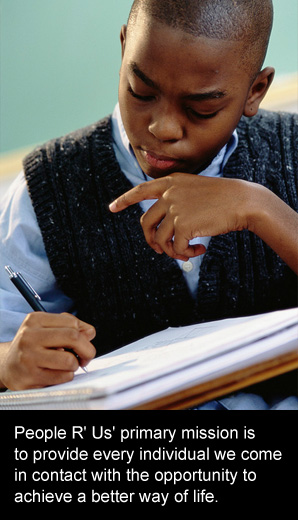The purpose of the ISP is to identify the supports and services that the client needs or wants, to assist the client in developing skills necessary to live successfully in the community, and to ensure that providers of services understand and fulfill their responsibilities. The ISP is a contract between the client, the agency, and the group of stakeholders.
The elements of the Individual Service Plan are developed in concert with the client, the client's family or legal guardian, other trusted adults, the Counselor, and a representative of the court system if appropriate. The purpose of including all of these people is to create a group of stakeholders who will work together to help the client reach his personal goals.
People R'Us believes that individual treatment for mental health and substance abuse situations can only be successful if that treatment is tailored specifically to the culture and individual needs and strengths of the client, as expressed by the client, by significant others in the client's life, and as identified by extensive review of records and biopsychosocial evaluation. Our first responsibility to the youth referred to People R'Us is for the safety of those youth. Therefore, the family will be asked to participate in the youth's ISP development to the extent that the participation of family members is emotionally and physically safe for the youth. The goal of every ISP is the discharge of the client. Planning for discharge and for aftercare is an integral part of People R'Us' process from the initial interview until discharge.
Thinking for a Change
Thinking for a change is an integrated, cognitive behavior change program that includes cognitive restructuring, social skills development, and development of problem solving skills in 22 lessons. Lesson topics include: active listening; asking a question; giving feedback; our thinking controls how we act; paying attention to our thinking; recognizing the thinking that leads to trouble; finding new thinking; using thinking check ins; knowing your feelings; understanding and responding to the feelings of others; preparing for a stressful conversation; responding to anger; dealing with an accusation; five steps of problem solving; and a self-evaluation of areas for further skill development.
The Therapeutic Community:
The quintessential element of the Therapeutic Community is community. What distinguishes this from other treatment approaches is the purposive use of the community as the primary method to bring about needed social and psychological change in the individual. Every activity in a TC is designed to produce therapeutic and educational change in individual's participants.
Reality Therapy:
Reality Therapy is a psychiatric treatment based on the concept that some clients deny the reality of the world around them. Therapy is directed to assist such clients to recognize and accept the present situation. The main technique is confrontation; the therapist consistently confronts the client with the reality of the situation. Illness or pathology is viewed as a defense against the real world. The purpose of the confrontation is to minimize the distortion.
Cognitive Therapy:
Cognitive Therapy deals with the client's awareness, with perception, reasoning, judgment, intuition, and memory - the mental processes by which knowledge is acquired. A client with normal functioning mental processes would have insight into his or her illness.
Gestalt Therapy:
Gestalt Therapy is based on the concept that the configuration of objects and experience is present as a whole formation that cannot be analyzed by breaking it into its component parts. This is a form of therapy that emphasizes the treatment of the person as a whole with a focus on the reality of the present time and place, and with an emphasis on personal growth and enhanced self awareness.
Transactional Analysis:
Transactional Analysis is defined as psychotherapy involving role playing in an attempt to understand the relation between client and therapist and eventually the relation of the client to reality.
Systems Theory:
Like Gestalt Therapy, systems theory is an approach that considers the human being as a whole as opposed to his parts. Human beings are considered open systems constantly exchanging information, matter, and energy with the environment. There are three levels of reference for systems; the system-level on which one is focusing, such as man; the supra systems-level above the focal system, such as man's family, the community, and the culture; and subsystem, the level below the focal system such as the bodily systems and the cell. Health care interventions clinically used for treatment transcends the idea of treating illness and addresses the larger issue of attaining and maintaining health through assessment and treatment of the total person.
In order to serve the chemically dependent population the self-help aspects of the program are extended to include mental health consumer related issues and education.
Psychosocial Rehabilitation
The Psychosocial Rehabilitation Model is a model that was developed mainly by providers of mental health services. It is based on the belief that much of the symptomatic behavior is the result of poor social learning. Psychosocial Rehabilitation focuses on re-educating the client in areas of everyday living.
Behavior Modification
Behavior Modification Therapy is a system of rewards and sanctions, which can be built into the structure of the program for specific clients. Clients are assigned responsibilities and awarded privileges as they successfully master these responsibilities. Individual behavior oriented treatment plans are routinely used. Special behavioral plans or contracts may be designed for clients having special problems around particular behaviors.
Showers/Dress (Hygienic concepts implemented) Breakfast (all residents are present) Morning meditation/Daily reflections Light exercise Community meeting
Goals/Group-Suggested Topics:

Academics (tutorial support systems for reading evaluating appropriate subjects relating to the educational process and determining the deficiencies of the resident)
Lunch (all residents are present) PM- Group Sessions-Suggested Topics:

Copyright 2011People R Us Community Residential Services
All Rights Reserved
Website Designed by Jon Carlo Stubblefield
www.hyperextremedesign.com